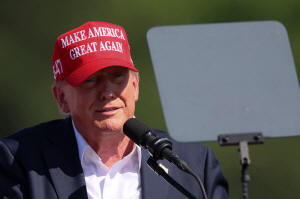How a Trump election victory could ruffle Latin American markets
 Send a link to a friend
Send a link to a friend
 [July 09, 2024] By
Rodrigo Campos [July 09, 2024] By
Rodrigo Campos
NEW YORK (Reuters) - The possibility of former President Donald Trump
winning back the White House in November has investors preparing for
various scenarios, with "America's backyard" high on the list of markets
to look out for.
The Trump administration had terse relations with much of Latin America,
including during the distribution of COVID-19 vaccines and when the U.S.
government withheld key financial aid in exchange for stricter migration
policies in Central America.
Below are flash points identified by investors anticipating how a
possible second Trump administration could impact the region:
A GOOD NEIGHBOR
Mexico has long been an emerging markets weather vane for U.S. policy
and its impact on wider emerging markets, but this time domestic factors
would make the situation more complex.
Trump's 2016 election win sent the peso down nearly 8% in a week.
But this time around, the peso is already down 6% this year after
slumping in June when the ruling party in the country's election closed
in on a super-majority, with markets fearing constitutional changes and
diminished checks and balances.
On U.S.-Mexico relations, trade is expected to top the agenda, according
to analysts. Trump spearheaded the revamp of the U.S.-Mexico-Canada (USMCA)
trade deal and a scheduled review is two years away. The next U.S.
president gets a chance to confirm whether his country will stay in it.
"Trump is very unlikely to exit USMCA, but he might threaten to do so in
order to extract higher tariffs and more inward investment in U.S.
manufacturing," said Hasnain Malik, head of equity research at Tellimer
in Dubai.

"For Mexico, more broadly, the relationship will be less comfortable,
with Trump's focus on border controls potentially hurting longer-term
growth of remittances."
The peso is expected to be volatile ahead of the U.S. election as
traders use it to hedge or to double down on the probability of Biden
being reelected.
PERSONAL RELATIONSHIPS
Two of Latin America's most flamboyant right-wing populists - El
Salvador's President Nayib Bukele and Argentina's President Javier Milei
- featured with Trump in February's Conservative Political Action
Conference, which is the largest meeting of U.S. conservative activists
and politicians. Both countries are looking for financial support from
the Washington-based International Monetary Fund (IMF).
Back in 2018, Trump outspokenly supported Argentina's then-president
Mauricio Macri in his push for IMF money, which developed into a massive
$44 billion program. Milei, a public Trump-backer, is widely expected to
ask for fresh cash once the current program ends in December - if not
before.
[to top of second column] |

Former U.S. President and Republican presidential candidate Donald
Trump speaks while holding a campaign event, in Chesapeake,
Virginia, U.S. June 28, 2024. REUTERS/Brendan McDermid/File Photo

El Salvador's Bukele is also expected to reengage with the IMF after
the U.S. election with the aim of getting a new program. An El
Salvador offer in April of a bond that would bump up returns if the
country failed to get either a new IMF program or a significant
credit rating lift in the next 18 months was seen by analysts as a
Bukele bet on Trump winning the White House and putting in a good
word for him at the IMF.
"(Bukele) is pretty tight with the Republicans," said Thys Louw,
portfolio manager with Ninety One, adding El Salvador is also trying
to find new financing elsewhere.
"The hope is that once you get a Trump administration, they'll lean
on the IMF, and the IMF will be much more lenient towards them."
VENEZUELA SANCTIONS PROSPECTS
The way Venezuela's July 28 presidential election will unfold could
likely determine whether it has any prospect of rejoining the
international community. In his previous term, Trump ratcheted up
sanctions against the South American oil producer; Biden has tried
to reestablish ties with a view of guaranteeing fair elections.
The next U.S. president will likely determine whether a massive debt
restructuring - Venezuela owes at least $60 billion on sovereign
bonds alone - will come to pass, as it requires new bond issuance,
currently barred by U.S. sanctions.
"Venezuela is one of those countries that is likely to be subject to
change under a Trump administration," said Bradley Wickens, CEO of
Broad Reach Investment Management, adding Venezuelan bonds trading
at deeply distressed prices could be enticing to investors against
the backdrop of a detente between Washington and Caracas.
"Not sure that continues under Trump."
Relationships with Cuba and Nicaragua, both led by authoritarian
governments, are also expected to strain further under a Trump
administration.
CHINA TRADE WAR ESCALATION
Hurdles and added costs to trade with China imposed during the Trump
administration were kept in place by Biden, who has further
ratcheted up the heat on Beijing.
Some analysts expect if the trade war with China intensifies,
Beijing might opt to devalue its currency to make exports more
competitive. Such a move could be felt by commodity exporters in
Latin America, with Brazil, Argentina, Mexico and Chile among
Beijing's largest regional trade partners.
(Reporting by Rodrigo Campos, additional reporting by Libby George;
Editing by Jamie Freed)
[© 2024 Thomson Reuters. All rights
reserved.]
This material may not be published,
broadcast, rewritten or redistributed.
Thompson Reuters is solely responsible for this content.
 |